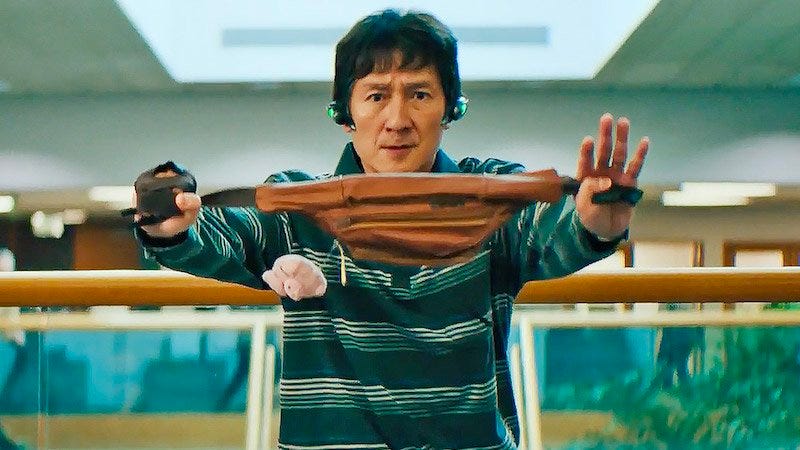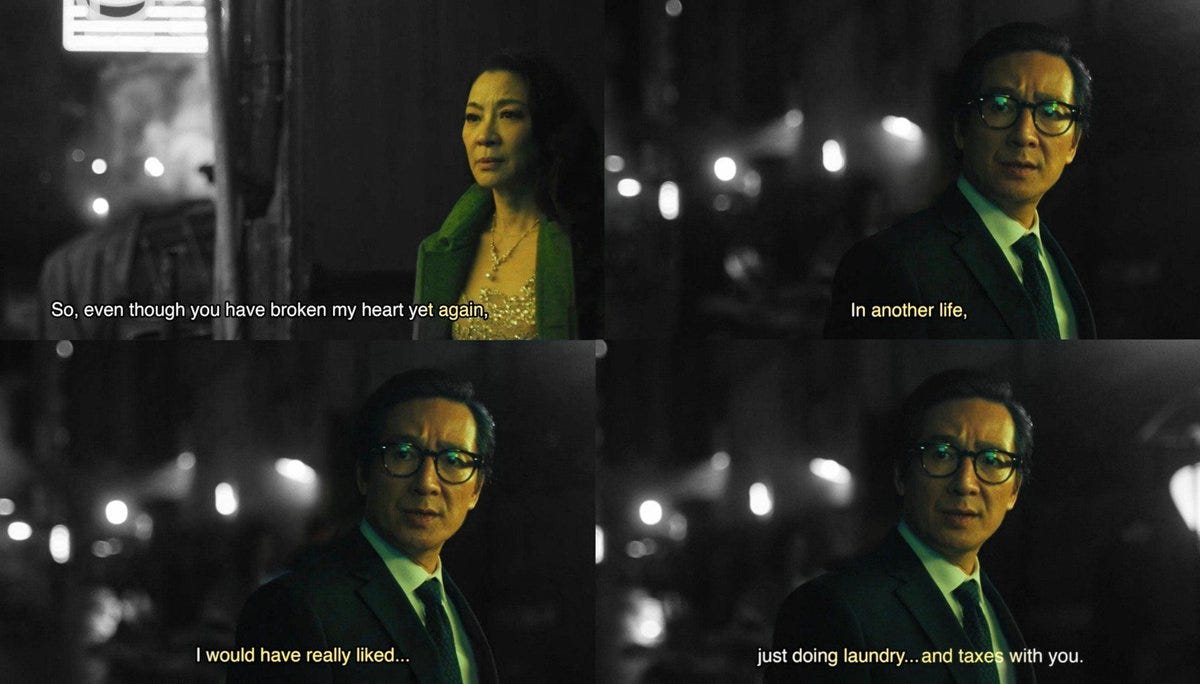Everything Everywhere All At Once & Radical Kindness
Waymond Wang's, in particular.
True to its name, Everything Everywhere All At Once, directed by the Daniels (Daniel Kwan and Daniel Scheinert), manages to fit an almost endless number of topics into the movie. Through one of the most remarkable depictions of the multiverse in modern cinema, it talks about intergenerational trauma, the complicated hurt ingrained in mother-daughter relationships, nihilism, aging and getting older, the true immigrant experience in America. But also, the film is about family. It’s about active kindness. It’s about choosing love, despite– choosing to own a struggling laundromat and talk about taxes with somebody you love who loves you back and discovering unlimited potential. Choosing your loved ones over the entire universe, despite having it in the palm of your hand.
The film, in a way that we have yet to see enough of in cinema, rallies for radical kindness. These characters, put in impossible conditions, choose to convert to this way of thinking by the end of it. But to discuss this particular strand of kindness in the film, it is essential that we talk about Waymond Wang, played by Ke Huy Quan– the husband of our protagonist, Evelyn Wang.
As watchers of the first half of the film, we view Waymond Wang as nothing but the one-dimensional stereotype of the timid, pushover husband. We cast him aside. In the face of the impossible odds that he is presented with, he remains the way he is. We cannot help but see it as incompetent and even naïve– how he champions positivity and kindness in his circumstances.
The Waymond that we, the watchers, are familiar with, is juxtaposed with the Waymond from the Alphaverse. Alpha Waymond is assertive, confident, dominant– a complete antithesis of the Waymond Wang we know. We, along with Evelyn (played marvelously by Michelle Yeoh), are captivated by Alpha Waymond. That is, of course, until he reveals that he’d been using Evelyn all along to “make the Alphaverse greater.” Which is… Not what we (or Evelyn, for that matter) were expecting from this seemingly better version of the Waymond we’re used to. That one, her Waymond, is considered a “beta male.” Beta male Waymond, we realize, is ultimately a hero.
As the movie progresses, we discover more layers of Waymond that we experience for the first time with Evelyn. We see that this rally for kindness is nothing but passive, but in fact the way that he fights against what he’s faced with. We discover this first when he gives his speech.
The only thing I do know is that we have to be kind. Please, be kind. Especially when we don’t know what’s going on.
This kind of message is the most impactful in their circumstances. This messages, that nothing matters so we must do what we love, be with with who we love, find joy in the mundane, and be kind. Waymond uses his kindness as a weapon against existential despair, which is arguably the single most powerful weapon.
Waymond, in a different universe, is a given time to explain why he thinks this way.
You tell me that it’s a cruel world, and we’re all just running around in circles. I know that. I’ve been on this earth just as many days as you. When I choose to see the good side of things, I’m not being naïve. It is strategic and necessary. It’s how I’ve learned to survive through everything. I know you see yourself as a fighter. Well, I see myself as one too. This is how I fight.
Using this kindness as a weapon is what Evelyn eventually circles back to in order to win the battle against the tragic nihilism represented by the everything bagel and Jobu Tupaki, the villain played by Evelyn’s daughter, Joy Wang.
This is where we begin to see elements of Yin and Yang. Evelyn adopts Waymond’s way of thinking, effectively learning from him and implementing it, by leaning towards Yin. This is represented by the googly eye she sticks on her forehead in lieu of a third eye, and the idea that life is mostly worthwhile, and suffering is fixable and temporary. The everything bagel is the complete opposite of this, rallying for the idea that life is dull, and any joy felt is ultimately meaningless in the grand scheme of things.
Waymond Wang doesn’t have a character arc, but his character is all the more meaningful for it. We see all these versions of him where he does all sorts of things but once we begin to slowly understand the original Waymond, we begin to see how he, despite possessing the same beliefs that he did in the beginning of the film, is a hero– and not a weak one.
Written by Isra.




